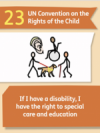Golftyn Primary School Additional Learning Needs Policy
This is a statement of Additional Learning Needs Provision at Golftyn C.P. School and the procedures for its implementation.
The ALN legislative framework is created by the Additional Learning Needs and Education Tribunal (Wales) Act 2018 (the ALN Act), the Additional Learning Needs Code for Wales 2021 (the ALN Code) and regulations made under the Act. Through this statutory framework the Welsh Government aims to ensure all learners with ALN are supported to overcome barriers to learning and can achieve their full potential, by creating:
DEFINITION OF ADDITIONAL LEARNING EDUCATIONAL NEEDS:
The definition of additional learning needs (ALN) is taken from the Additional Learning Need Code of Practice (2021) Wales, which defines ALN as:
A person has additional learning needs if he or she has a learning difficulty or disability (whether the learning difficulty or disability arises from a medical condition or otherwise) which calls for additional learning provision.
Additionally:
“A child is not regarded as having learning difficulties solely because the language of the home is different from the language in which he/she will be taught.”
STATEMENT OF INTENT
As a school, we recognise that we have approximately 20% of children who have additional educational needs and this fact is borne in mind when teachers plan the curriculum for their class. It is the aim of this school to provide every child with the best education possible. This policy is designed to outline practices and procedures relating to all pupils who have an additional learning need.
AIMS
We aim to:
- Have due regard to the Additional Learning Needs Code Wales 2021
- Identify additional needs at an early stage and to follow the Additional Learning Needs Code of Practice (2021).
- Provide support where necessary in order that all pupils achieve success and progress according to their potential.
- Provide a relevant and broad-based curriculum within a caring environment in which all pupils, including those with additional learning needs, can develop and grow towards their full potential regardless of ability.
- Maintain a partnership with parents, school, the Local Authority and any outside agencies involved.
- Include pupils and their views at each stage.
- To have systems in place that ensure teachers are aware of pupil’s needs.
- Ensure that staff receive up to date training and are aware of research and developments in the area of additional learning needs.
OBJECTIVES
(Following the Additional Learning Needs Code of Practice)
- To identify a pupil’s additional learning needs as soon as possible, and to follow the Code of Practice for a graduated response.
- To use assessment data and tracking to inform decision making.
- To ensure appropriate resources are allocated to ensure the needs of pupils are appropriately met.
- To ensure children with additional needs are given full and equal access to a broad and balanced curriculum.
- To keep parents informed, actively encouraging involvement in meeting the needs of their children in partnership with the school, along with involvement in any decision making concerning their child’s learning provision.
- To use teachers, other professionals, facilities and resources from inside school and externally where appropriate. A Multi-disciplinary co-operative approach is needed.
- To regularly assess and review set targets (a minimum of twice yearly).
- To hold PCP meetings that include children. Parents and any in decision making if appropriate with regards to their targets and Individual Development Plan (IDP)
- To acknowledge and support Flintshire County Council’s Inclusion Policy. It is:
“The expected right of every child to access the equality of choice in a safe and secure environment to help each individual fulfil their potential regardless of age / gender or additional needs”.
THE ROLE OF THE ADDITIONAL LEARNING NEEDS CO-ORDINATOR (ALNCo) – non-teaching
The school ALNCo – Mrs Claire Williams who is employed full-time by the school, working 0.4 in Additional Needs and 0.6 teaching in class.
The named governor for ALN is Mrs Jenny Grey
The ALNCo will:
- Up-date the ALN policy.
- Co-ordinate the day to day provision for pupils with additional learning needs including the co-ordination of review meetings.
- Provide guidance and support to all staff.
- Co-ordinate the deployment of the ALNTA supporting pupils with ALN.
- Ensure that the Code of practice staged response is followed regarding identification, assessment and intervention.
- We will adopt a graduated approach coordinated by the ALNCO and using the universal, targeted and individual development plan, as recommended in the Additional Learning Needs Code for Wales 2021 Parents will be kept well informed of and involved in all stages.
- Help and support teachers in establishing Support Plans and IDP targets
- Work with class teachers to ensure that regular reviews are in place to monitor progress.
- Ensure that liaison with parents takes place both formally (reviews) and informally.
- Ensure that the pupils with ALN are included on the ALN Register (SIMS).
- Attend Group Consultation meetings with an Educational Psychologist and other ALNCo’s to discuss pupils at where progress remains a concern.
- Ensure that Additional Learning Needs are included in any curriculum development in school.
- Keep up-to-date with new developments by attending courses provided by the Local Authority and other organisations.
- Liaise with parents where necessary.
- Liaise with external agencies.
- Work with feeder or transition schools.
- Provide the Head Teacher with a termly report to be presented to the Governing Body concerning ALN information.
- Providing the LA with detailed information regarding ALN provision.
- Ensure confidentiality of all sensitive information and keep relevant records in the ALN room.
Support for targeted children and children who have an IDP is provided by an experienced Additional Learning Needs Teaching Assistant (ALNTA) who has received training in providing appropriate support for ALN pupils. The support is provided individually (IDP) or within a small group (TARGETED) for weekly sessions outside the classroom. The teaching sessions are held in the purpose specific ALN room to enable pupils to develop their confidence as learners.
THE ROLE OF THE GOVERNOR
The nominated governor will:
- work closely with the Head Teacher and the ALNCo;
- play a full part in the development of the ALN policy;
- review through consultation, the implementation of the policy;
- report to governors and to parents.
THE ROLE OF PARENTS
We encourage parents to:
- work closely with the school in order to develop a partnership that will support additional needs pupils;
- take part in PCP meetings to discuss and review IDPs;
- attend multi-agency meetings where necessary.
THE ROLE AND RIGHTS OF PUPILS
We encourage pupils with additional learning needs to:
- understand their rights and to take an active role in assessing their needs;
- take part in devising and reviewing their IDPs;
- set their learning targets.
The Role of the Local Authority
- The Local Authority has a statutory duty to develop and publish a Local Offer which gives ‘information about provision they expect to be available across education, health and social care for children and young people in their area who have ALN or are disabled, including those who do not have IDPs. In setting out what they ‘expect to be available’, Local Authorities should include provision which they believe will actually be available.’
RANGE OF PROVISION
The school aims to provide a variety of provision by way of:
- in-class support either individually or in small groups with learning support assistants;
- withdrawal support either individually or in small groups with the ALNTA.
- accommodate pupils with physical difficulties.
IDENTIFICATION, ASSESSMENT AND LEVEL OF INTERVENTION
- It is vital that pupils with additional learning needs are identified at an early stage.
- It is the responsibility of every teacher in this school to identify pupils with additional learning needs.
- Along with the class teachers, early identification can be by parents, medical services or social services.
- When identifying an additional learning need, the class teacher will consider the child’s progress, measured against age appropriate standards, progression compared to peer group and scores in standardised tests and other assessments.
- A meeting is then held between all relevant parties.
GRADUATED APPROACH
- It is vital that pupils with additional learning needs are identified at an early stage.
- Every teacher in this school is responsible for identifying pupils with additional learning needs.
- We will inform parents at the earliest opportunity of the school’s concerns and to work in partnership with them to establish the support the child needs.
- We will adopt a graduated approach coordinated by the ALNCO and using the universal, targeted and individual development plan, as recommended in the Additional Learning Needs Code for Wales 2021.
- Parents will be kept well informed of and involved in all stages.
INDIVIDUAL DEVELOPMENT PLAN
- If the Class Teacher and ALNCo feels a child is not making progress and the need of the child is additional to or different from the usual in class support then a Person-Centred Practice Meeting will be held to include the learner, class teacher, parents ALNCo and any agencies involved to contribute and develop and IDP
Following the graduated response in the Code of Practice, a Statutory Assessment may be requested from the Local Authority if the child still continues to make no progress and remains a cause for concern. This involves consideration by the LEA, working cooperatively with parents, the child’s school and, as appropriate, other agencies, as to whether a statutory assessment of the child’s additional learning needs is necessary.
The ALNCo will:
- be responsible for co-ordinating meetings and reviews with outside agencies and parents;
- agree a date for the annual review.
The ALNCo and the class teacher will:
- ensure the pupil receives extra support in addition to the differentiated curriculum;
The annual review will:
- assess the progress of the pupil in relation to the IDP targets;
- review the provision made for the pupil;
- consider ending, continuing or amending the existing statement;
- set new targets for the following year.
Intervention
As outlined in the Code of Practice, most ALN interventions will take place in the classroom. The Code of Practice states that once pupils have been identified as having ALN, the school will intervene through either Early Years Action/School Action or Early Years Action Plus/School Action Plus. As the Code of Practice states:
“There should be differentiation between the stages which should aim to match the action taken on behalf of a child to his or her needs.”
TRANSFERS:
Class transfers: there needs to be close liaison between class teachers regarding the transfer of ALN pupils. All information is shared to ensure the appropriate interventions continue.
School transfers: when a pupil on the Additional Needs Register leaves the school, records of their work, IDPs, reviews etc are forwarded to the receiving school together with the pupil’s other records. There is a section on the Pupil Transfer Form to identify pupils with ALN.
The admission of pupils with a statement of ALN will be decided by the Local Education Authority. All applications for admission, at any age, will be referred to the Statementing Officer of the Authority. It will be their responsibility, following consultation with the Head Teacher, to decide if this school can meet the requirements of the pupil. The school’s normal admissions policy will also apply to pupils with a statement.
Transfer to High School: all documentation is transferred to the High School and discussion about individual needs takes place between the ALNCo and the ALNCo from the High School.
DYSLEXIA FRIENDLY SCHOOL STATUS (see Dyslexia Friendly School Policy)
- The school has been accredited with Dyslexia Friendly School Status;
- The school has a Dyslexia Friendly School Policy which outlines good practice for pupils with dyslexia.
- All staff are aware of appropriate teaching methods and resources.
- All staff are aware of the individual pupils in their class who have dyslexic tendencies.
- The school has effective procedures for identifying and supporting pupils with dyslexia.
- The multi-sensory teaching approaches outline good practice for all pupils with additional learning difficulties.
- The school follows the County Council’s guidelines to meeting the needs of children with dyslexia.
- There is no one agreed definition or description of dyslexia. Since 1999 the definition of dyslexia accepted by Flintshire County council has been:
“Dyslexia is evident when accurate and fluent word reading and/or spelling develops very incompletely or with great difficulty. (BPS definition 2005)
This focuses on literacy learning at the word level and implies that the problem is severe and persistent despite appropriate learning opportunities. It provides the basis of a staged process of assessment through teaching.”
It is considered that there is no single test which will indicate the presence of dyslexia rather a range of tools which can be used over a period of time. Hence the expected procedure (outlined by the LA) is that assessment and review of reading development will be ongoing.
AUTISM FRIENDLY
We have achieved whole school Autism Awareness Certification with all staff having completed the training. Identification of autistic tendencies provides each child with the environment, teaching strategies and learning opportunities which will help them to succeed.
THE MORE ABLE and TALENTED CHILD
The more able and talented child has a right to additional learning needs provision. Often they can be frustrated and behaviour problems may occur.
It is important that any child whose work in a particular curriculum area is far above the remainder of his/her age group should be identified and provided for as soon as possible.
MATHS
It is recognised by the school that children do not just have additional learning needs in Language, but also in other Curriculum areas – especially Maths.
There is early identification, in different year groups, requiring particular support in either literacy or numeracy. Appropriate support, in smaller groups, is then provided where funding and resources allow.
PHYSICALLY DISABLED PUPILS (see the Diversity and Equality Policy and the Accessibility Plan)
- It is the school’s policy to provide a full curriculum for all pupils.
- The main entrance of the school is accessible to wheelchairs. The nursery also provides wheelchair access.
- The interior of the school does provide full access to wheelchairs.
- There is a specific disabled toilet.
ADDITIONAL NEEDS RECORDS
Each teacher has an Additional Needs File containing copies of all relevant information concerning children in their class who are on the Additional Needs Register. This information, which is regularly updated, includes:-
- IDPs, revised targets, assessments from outside agencies and copies of statements from the LA,
- IBPs, behaviour strategies and relevant information concerning pupils in their class,
- ALN Guidelines for Staff,
- Information available from previous schools and any external agencies.
- Individual one page profiles.
All the information in the Additional Needs file will move with the child concerned to their next teacher. This will ensure continuity in the provision of additional learning needs.
COMPLAINTS PROCEDURE
Parents who have a grievance or complaint about the nature or amount of additional needs support that their child receives are encouraged to ask for a mutually convenient meeting with the school in order to resolve the issue.
EVALUATION AND REVIEW
The effectiveness of the ALN provision provided by the school will be undertaken annually by the Governing Body and reported to parents in the Annual Governors Report. The ALN policy is a working document and is kept under constant review.
All relevant and updated ALN information is stored on the ALN Drive.
| Head Teacher: | Mrs N Cooper | Date: | |
| ALN Governor | Mrs J Gray | Date: | |
| Chair of Governing Body: | Mr N Cottrell | Date: |
GOLFTYN C.P. SCHOOL
INITIAL CONCERN MONITORING FORM
Name of pupil……………………………………D.O.B……………… YR………
Concern expressed by…………………………………………….
Pupil information: include strengths / weaknesses, test results, teacher observations, attendance, parents’ and pupil’s views.
MAIN AREAS OF CONCERN.
COURSE OF ACTION / TARGET (including teaching strategies, class interventions, home support)
Parental involvement / views of parents.
Signatures of Parents……………………………………..Date………………….
REVIEW PROGRESS (after 6 weeks).
Date………………………
FUTURE ACTION



